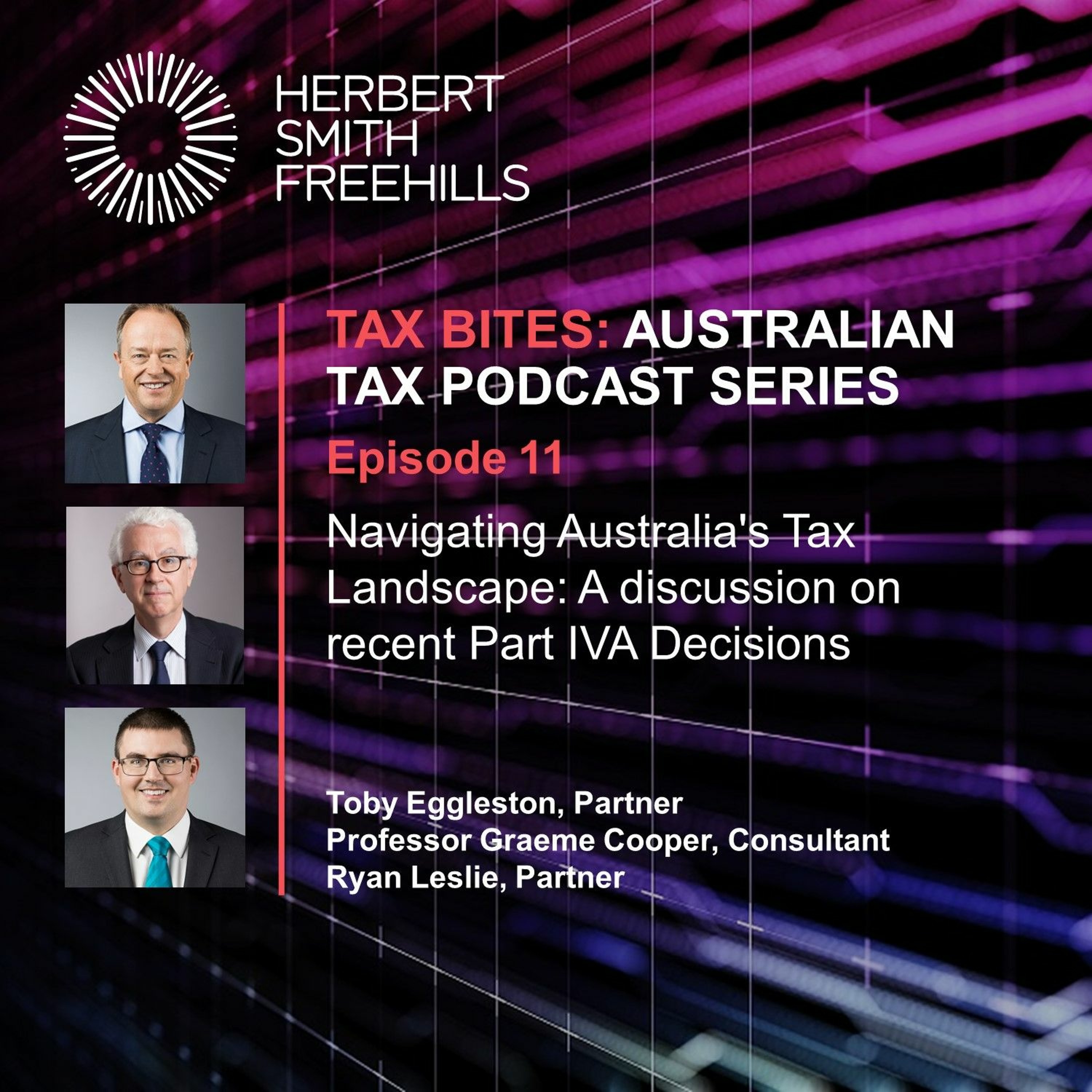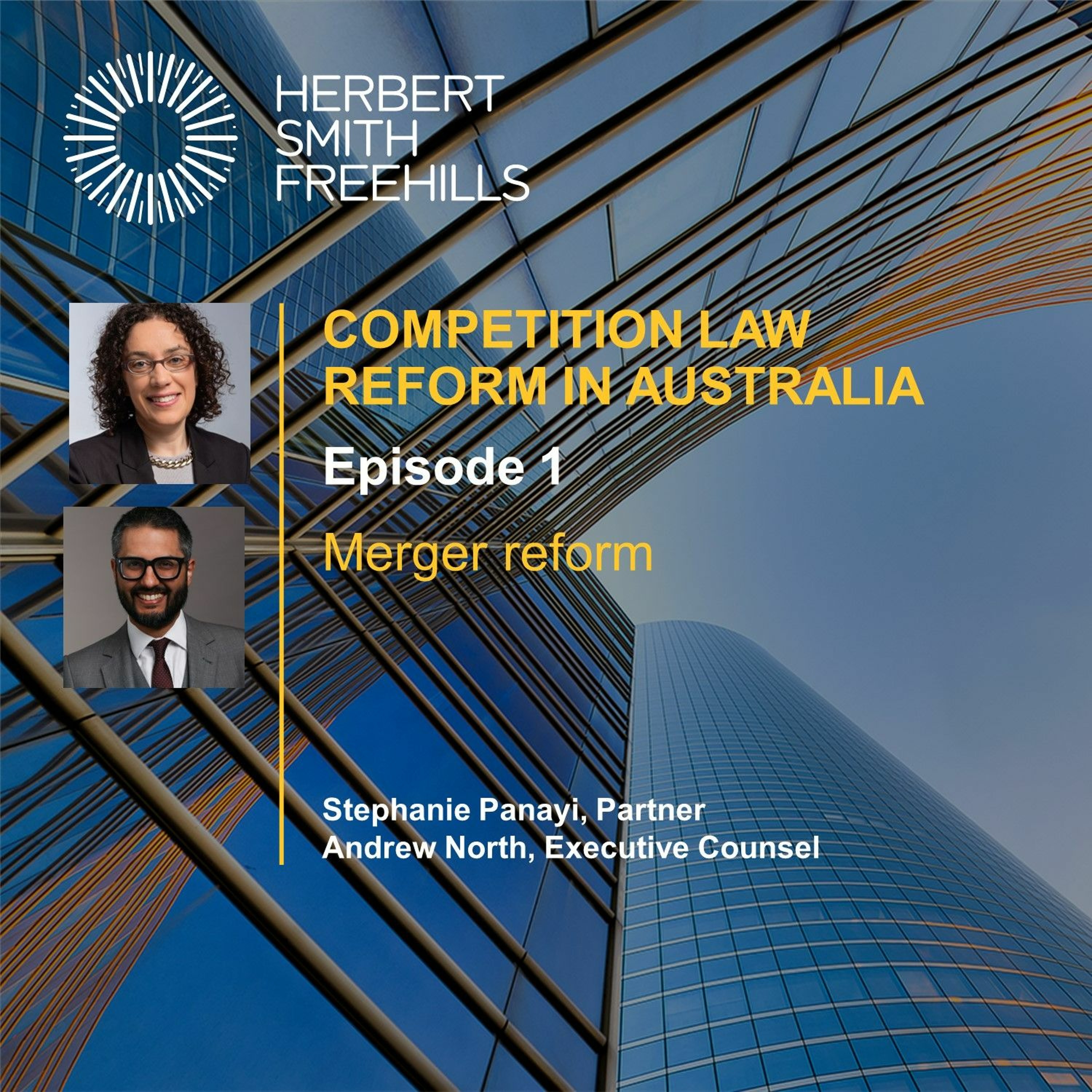Discover Herbert Smith Freehills Podcasts
Herbert Smith Freehills Podcasts

Herbert Smith Freehills Podcasts
Author: Herbert Smith Freehills Podcasts
Subscribed: 121Played: 7,737Subscribe
Share
© All rights reserved
Description
A series of thought leading podcasts ranging on topics and sectors by Herbert Smith Freehills. For more information please visit www.herbertsmithfreehills.com
928 Episodes
Reverse
In this episode of the Herbert Smith Freehills Tax Bites podcast, Toby Eggleston partners with Consulting Professor Graham Cooper and fellow partner Ryan Leslie to dive deep into recent Federal Court decisions on the anti-avoidance provisions in Part IVA of the Income Tax Assessment Act 1936. The discussion begins with insights into the Minerva Financial Group vs. Commissioner of Taxation, highlighting the saga of restructuring for an IPO and the accompanying tax implications. Also explored is the Mylan Australia Holdings case involving a debt push down strategy and the ATO’s application of Part IVA. The episode touches on pivotal aspects such as the significance of counterfactual scenarios, determination of tax benefits, and the overarching question of dominant purpose in context to Part IVA. The conversation also delves into the potential implications of the 2012 amendments compared to the pre-amendment rulings and foreshadows the impact of recent budget announcements on future tax avoidance disputes.
00:00 Welcome to the Tax Bites Podcast
00:32 Deep Dive into Part IVA Decisions: Minerva Financial Group Case
14:04 Exploring the Mylan Australia Holdings Case: A Debt Push Down Analysis
30:01 Impact of 2012 and 2023 Part IVA Amendments on Tax Law
40:33 Final Thoughts and Future Directions in Tax Law
Want to go deeper? Read our tax notes on the cases
https://hsfnotes.com/taxaustralia/2024/03/12/minerva-financial-group-pty-ltd-v-commissioner-of-taxation/
https://hsfnotes.com/taxaustralia/2024/03/21/mylan-tax-note/
Tony Damian and Andrew Rich are back! Himalayan Bites kicks off with our Q1 2024 review.
Join Partners Michael Vrisakis and Andrew Eastwood and solicitor Abby Sutherland in conversation on reasonable steps obligations and conflicted remuneration, as illuminated in the recent case of Australian Securities and Investments Commission v R M Capital Pty Ltd [2024] FCA 151.
Lucy McCullagh, Alice Molan, Mark Hatfull and Naomi Hutchings delve into the multifaceted world of carbon offset projects working toward Australia’s net zero and nature positive goals, from regulatory considerations to project finance and structuring. Key concepts are outlined including the Carbon Farming Initiative Act, the Australian Carbon Credit Unit (ACCU) scheme and the need to comply with financial services laws. They anticipate continued growth in the offset market driven by domestic and international players, the rise of joint ventures and debt financing, whilst acknowledging integrity issues and the importance of significant collaboration and partnerships.
Andrew Eastwood and Bryony Adams discuss an important Federal Court judgment handed down recently in ASIC v Noumi Ltd which has wide-ranging implications for organisations facing litigation and regulatory proceedings and their approach to legal professional privilege, particularly those in the banking and financial services sectors.
Andrew Eastwood and Bryony Adams discuss an important Federal Court judgment handed down recently in ASIC v Noumi Ltd which has wide-ranging implications for organisations facing litigation and regulatory proceedings and their approach to legal professional privilege, particularly those in the banking and financial services sectors.
In this episode, we return with Part 2 of our discussion with Bill Siegel, the CEO of Coveware. We look closely at Coveware itself (and its history), the scope of Coveware’s services, how threat actor negotiations unfold, banning ransom payments, the role of the cyber simulation and what makes a good simulation. We also discussed the role of the board during an incident and managed to squeeze some cyber predictions out of Bill, including the impacts of AI on the cyber landscape. This is a “must listen” episode!
This month Jojo Fan spoke with Cindy Hui, General Counsel for Alibaba's International Digital Commerce Group. Cindy shares her tips for young women looking to enter new tech industries, and the trend towards work-life integration enabled by increased connectivity and new ways of working.
In our first Podcast on the work of the Treasury Taskforce, Stephanie Panayi and Andrew North delved into the merger reform proposals that were under consideration by the Treasury Taskforce preceding today’s Government announcement.
Leveraging Andrew's extensive knowledge of the UK and EU merger regimes, we dissect several key aspects of the Treasury’s consultation including:
🔹 why the ACCC considers there is a case for merger reform 🔹 the reform models on the table and how the merger test may change 🔹 what the notification thresholds might look like 🔹 how ancillary agreements might be managed 🔹 the interaction between FIRB and the ACCC 🔹 when we should expect to see change.
Stay tuned for more insights and updates on the merger reform proposals and other considerations of the Treasury Taskforce.
Jacqueline Wootton, Christine Wong and Christopher Hicks discuss the intersection between corporate criminal responsibility and ESG in a Third Wheel X Investigate 360 collaboration episode exploring governance, social licence to operate and the regulation of ESG issues under criminal standards. The serious risks associated with criminal matters are underlined, from corporate penalties and investigations through to individual prosecution and reputational consequences as well as the patchwork of inconsistent standards and methods for determining when a company will be held criminally responsible. They discuss the ongoing road to reform, including a radical change in relation to foreign bribery and the potential introduction of Deferred Prosecution Agreements. Our team conclude with some of the steps companies can take to future proof their business to respond to criminal liability and risk.
UK Employment Law changes in force from 6 April
It is estimated that 55% of the UK workforce is planning on requesting flexible working hours once some significant changes to Employment Law, including to the flexible work request regime, come into effect from Saturday 6 April. https://hsfnotes.com/employment/2024/03/29/uk-april-2024-hr-checklist/
Employers need to be aware of these changes, which extend to family leave rights, redundancy protection, tribunal compensation award limits, minimum wage and pay for statutory leave, and update staff policies and handbooks accordingly.
In this episode, Christine Young and Anna Henderson discuss the changes to various family leave rights and changes to flexible work request regime, and suggest best next steps for employers.
Contact us (georgie.hobern@hsf.com) if our team can assist yours when making the necessary updates to policy.
How can companies prepare for the assurance requirements when they’re still a moving target in and of themselves…?
In this episode, we talk about the current proposal from the Australian Auditing and Assurance Standards Board (AUASB) for phased assurance (with consultation open until 3 May 2024). We also talk through some practical steps that companies can be taking now to prepare for assurance of climate reporting.
Climate-related risk is probably one of the better understood concepts under ASRS, however, how will companies expand that framework to include disclosure of their management (i.e. identification, assessment, prioritisation and monitoring) of climate-related opportunities as well?
The ASRS risk management pillar requires companies to deep dive into their risk management framework (processes, policies and perspectives) and use scenario analysis as a tool to stress test company performance. While risk management is often a structured process internally, in this episode we talk about the learning curve for companies to consider climate opportunities with the same level of rigour and formalised process.
The new regime will require unprecedented levels of forward-looking information to be included in corporate reporting, as well as dependencies on estimation and third-party data with respect to Scope 3 emissions. Directors will also be asked to declare their reporting is compliant with the ASRS.
The modified liability has been reshaped various times throughout Australia’s journey towards mandatory climate-related disclosures. It will be important for companies to understand what is (and importantly, what is not) protected under the modified liability regime – and for how long. In this episode, we talk about the liability regime underpinning the proposed legislation, along with transitional arrangements for directors’ declarations.
Climate-related metrics and targets are already a key area of focus for stakeholders, but under the new regime there will be more granularity than has been disclosed in the past.
The ASRS metrics & targets pillar requires companies to take the leap towards granular quantitative disclosures (including in relation to Scope 3 emissions). In this episode, we talk about the need for a deep understanding of the related metrics, assumptions, interim targets and contingencies and how they factor into a company’s position and prospects.
Many Australian companies with overseas parent companies, operations, assets or subsidiaries will likely be required to comply with, and report against, multiple reporting regimes.
Translation of global standards into local law has meant that the different reporting regimes worldwide each come with their own nuances and thresholds for application. In this episode, we talk through some of the key regimes, including ways in which companies are moving to address the reporting challenge.
Disclosure under this pillar is not just headline statements and overarching direction. These mandatory climate-related disclosures will mean that a company’s “strategy” will need to include comprehensive disclosure of how climate considerations are integrated into decision-making.
The ASRS strategy pillar requires companies to focus not just on its transition plan and overarching strategic pathway for the company, but also how climate-related risks and opportunities are expected to impact on business model, financial position/performance and value chain. In this episode, we talk about the ways in which climate impacts, risks and opportunities will inform your disclosed strategy and prospects, including their linkages to planning and decision-making.
Board and management oversight of climate issues is not a new concept, but deciphering and disclosing how this occurs in practice is often a challenge.
The ASRS governance pillar requires quite granular disclosures of the board and management’s role in overseeing climate-related risks and opportunities. In this episode, we talk about how to articulate accountabilities and reporting ‘flows’ within the business, in a way that will support your disclosures longer term.
Now legislation for Australia’s new climate reporting regime has finally been introduced into Parliament, what impact will it have for corporates?... (and when?).
The new climate reporting regime is likely to require a significant uplift in corporate reporting – and will require considerable resources and effort over the next 12-18 months. This episode talks about how the regime will phase in, and how it might impact companies in practice.
The new reporting regime will be a prompt for companies to critically assess whether existing governance arrangements are ‘fit for purpose’ (and disclosure) in respect of climate impacts, risks and opportunities.
In this episode, we talk about how companies are stress-testing their governance arrangements, reconsidering the division of responsibility, board and management skill sets, and updating current governance documents (e.g. charters, agendas).

























This is exciting engagement. Thanks for the insights. I have found a new home